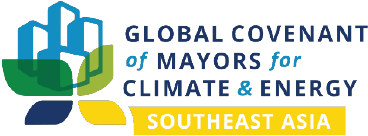Tangerang City, one of GCoM Southeast Asia’s pilot cities, recently conducted an energy audit aimed at enhancing energy efficiency in public buildings, schools, and local health facilities (puskesmas). The audit was performed under the framework of the European Union-funded GCoM Asia Project with the support of the United Cities and Local Governments Asia Pacific (UCLG ASPAC) as the GCoM Southeast Asia Secretariat. The project aligns with the city’s Climate Action Plan and aims to provide a comprehensive report on the existing energy consumption patterns with recommendations for a more efficient use of energy.
Kick-off Meeting
The audit commenced with a kick-off meeting on 29 January 2024 to outline the project’s background, scope, and preparatory measures, followed by a coordination meeting on 21 February 2024. Hundreds of buildings across the city were identified, with few chosen for detailed assessment. The building sector was targeted due to its rapid growth and significant energy consumption, which accounted for 21.6% of the city’s total energy consumption in 2020.

Working in line with official regulations, this project adhered to Government Regulation (PP) No. 33 of 2023 on energy conservation. Significant levels of energy consumption in buildings signalled a need for management, which is regulated in the PP, requiring local governments to conduct a regular energy audit and implement energy management within government facilities (Articles 36 and 39).
The energy audit in Tangerang City was carried out on two levels of 12 buildings. Level 1 audit focused on collecting historical energy performance data and the buildings’ characteristics and reviewing utility bills. While level 2 audit focused on on-site measurement, including inspections and validation of the building envelope, lighting, air conditioning (AC), and ventilations, estimation of energy consumption intensity, energy-saving opportunities, and dissemination of audit reports of the selected buildings.
Findings
A public consultation meeting was held to disseminate the energy audit findings and discuss the results with the Tangerang City government. The meeting attendees included the GCoM Asia Expert Team, GCoM Southeast Asia, the European Union Delegation to Indonesia, Tangerang City’s Development Planning Agency (Bappeda), the Environment Department (Dinas Lingkungan Hidup), Health Department (Dinas Kesehatan), Education Department (Dinas Pendidikan), and representatives from other Agencies/Departments (OPD).
The audit revealed that primary (SD) and secondary school (SMP) buildings in the city are the most energy-efficient, primarily because many of their classrooms are not equipped with air conditioning. Conversely, the mayor’s building was the highest consumed the most energy out of all of the buildings as a result of the high intensity of building usage. Based on the total electricity cost, AC and office equipment are the biggest energy consumers, making them the focus for energy efficiency improvements.

By implementing energy efficiency measures, Tangerang City could reduce greenhouse gas (GHG) emissions by approximately 1,574.29 tons annually. Additionally, this project could increase productivity by creating new jobs and improving indoor thermal quality in schools, leading to higher student performance.
An estimated IDR 16.5 billion is needed annually for energy management and efficiency, prompting the identification of alternative funding measures to finance this initiative.
Challenges
There are several challenges in conducting energy management and efficiency in Tangerang City. First, data collection and resource allocation proved to be complex and required a significant amount of time. This challenge is in line with the need to build a habit of energy management in local governments. Second, the lack of energy management expertise made it difficult to conduct energy consumption breakdowns. Third, efforts for energy efficiency exist but are not structured. Lastly, there is a need for greater knowledge and implementation of energy efficiency measures.
Recommendations
In response to the energy audit findings, the expert team recommended several efficiency measures, including appointment of an energy manager, savings on operation and maintenance of other equipment, utilisation of an automatic energy monitoring system to turn off unnecessary equipment, replacement to LED lighting, and modification of lighting system design.
Other measures include improvements on the building envelopes relating to the sun’s radiation, curtain installation, replacement of old ACs with newer energy-saving units, and installation of rooftop solar panels. Capacity building was also mentioned, highlighting the importance of knowledge and expertise specific to energy management.
A full comprehensive report of each of the 12 buildings will be provided to the Tangerang City government to facilitate further efficiency measures. With these reports, Tangerang City is optimistic that more supportive policies regarding energy management and conservation will be established for a more holistic and ambitious implementation of energy efficiency.

Written by: Nathania Azalia
Reviewed by: Rona Ikram Putri




